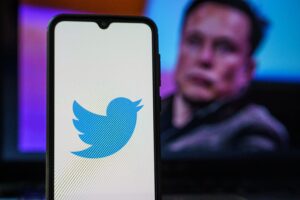
Elon Musk has suggested that he could seek to pay a lower price for Twitter, as the social media company’s would-be owner expressed further concerns about the presence of fake accounts on the platform.
The Tesla CEO said reducing his agreed $54.20 per share offer wouldn’t be “out of the question”, days after putting the $44bn ($36bn) deal “on hold” after he queried the number of spam accounts on Twitter.
Musk told the All-In Summit in Miami that the deal going through depended on Twitter’s response to his concerns about fake accounts.
“It really depends on a lot of factors here,” he said in comments reported by the Financial Times. “I’m still waiting for some sort of logical explanation for the number of sort of fake or spam accounts on Twitter. And Twitter is refusing to tell us. This seems like a strange thing.”
Twitter has repeatedly stated in its quarterly results over the years that fewer than 5% of its users are spam or fake accounts. Using a term that can be cited when companies want to reprice or scrap deals, Musk said it might be a “material adverse misstatement” if it emerges that Twitter’s fake or bot accounts amount to far more than 5%.
“Like if you said, OK, I’m going to agree to buy your house,” he said. “You say the house has less than 5% termites. That’s an acceptable number. But if it turns out the right per cent is 90% termites, that’s not OK.”
Lawyers have questioned whether Musk can walk away from the deal – or seek a new agreement at a lower price – by focusing on the bots issue. The deal agreement includes a $1bn break fee if Musk walks away, although Twitter can also enact a clause that could force Musk to complete the deal at $54.20 per share.
Twitter shares closed Monday down just over 8% at $37.39, below where the stock was just before Musk disclosed that he was Twitter’s largest shareholder.
Meanwhile, Musk’s relationship with Twitter’s management reached a new low on Monday after he tweeted a poo emoji at the platform’s chief executive.
— Elon Musk (@elonmusk) May 16, 2022
Musk was responding to a detailed Twitter thread posted by his Twitter counterpart, Parag Agrawal, explaining the company’s policy on spam accounts. Musk has disputed Twitter’s assertion that less than 5% of its users are fake or spam accounts and has said he will carry out his own audit.
Agrawal explained that tackling automated spam accounts was a “dynamic” process that required fighting “sophisticated and hard to catch” actors. He added that some accounts that appear to be spam are in fact operated by real people.
“The hard challenge is that many accounts which look fake superficially are actually real people. And some of the spam accounts which are actually the most dangerous – and cause the most harm to our users – can look totally legitimate on the surface,” he wrote. He added that estimating Twitter’s fake account numbers could not be done externally because the process required access to sensitive data such as IP addresses and phone numbers.
Agrawal ended the thread with a link to a company blogpost on spam accounts, while revealing that Twitter had discussed how it estimated its spam number with Musk a week ago and that the company looked forward “to continuing the conversation with him”.
Musk responded with a poo emoji, followed minutes later by asking how advertisers on Twitter knew what they were getting for their money.
“So how do advertisers know what they’re getting for their money? This is fundamental to the financial health of Twitter,” he tweeted.
On Saturday Musk tweeted that Twitter’s legal team had accused him of violating a non-disclosure agreement by revealing that the sample size for the social media platform’s checks on automated users was 100. Last month, Musk engaged with tweets criticizing Twitter employees, despite the entrepreneur agreeing not to “disparage” the company or its representatives while he completes the deal to acquire the social media platform.
Musk’s behavior, underlined by his comments in Miami, has prompted speculation that he is laying the groundwork to reprice the deal or walk away from it, which would carry the cost of a $1bn break fee for the world’s richest man. Some experts doubt whether the multibillionaire is serious about buying the company.
“I honestly don’t know if Elon wants to buy Twitter,” said Drew Pascarella, a senior lecturer on finance at Cornell University. “At first, I thought he wasn’t serious. Then he paired with banks and financiers and came up with a legitimate acquisition plan. Now he’s called a timeout about an issue that is both well known and should have no bearing on his future plan for the company. If it’s attention he’s seeking, he has it. But does he want to own Twitter? Did he ever?”
Read more:
Musk could seek lower price for Twitter as he focuses on fake accounts


